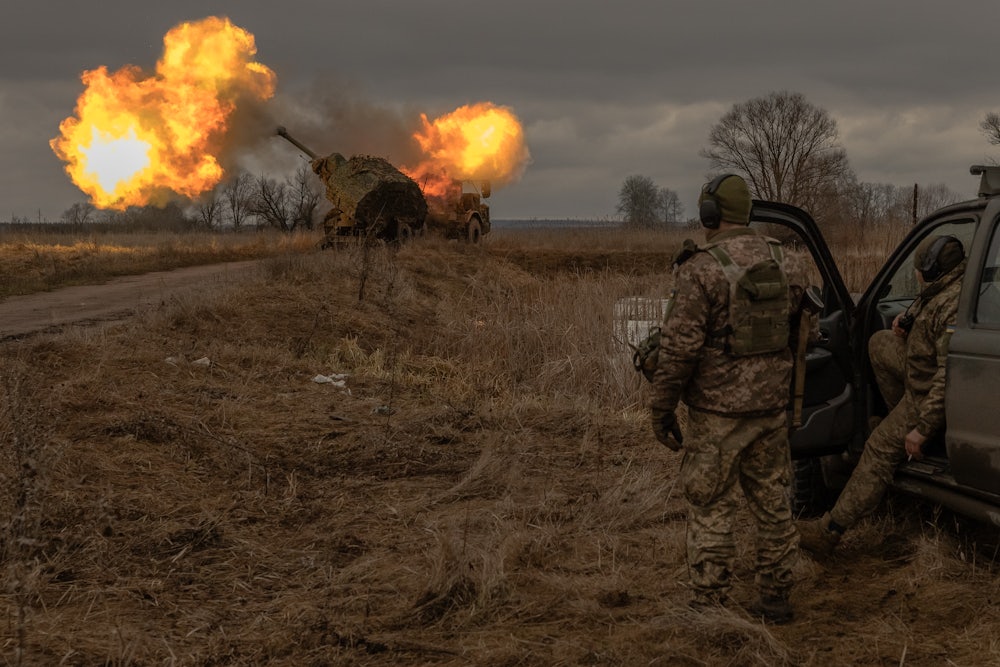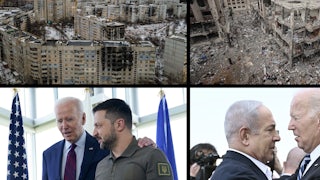While Beltway pundits debate the fate of the $60 billion aid package to Ukraine that is currently being held up in Congress, those on the frigid front lines say weapons and morale are beginning to run low thanks to isolationist Republicans.
With the resounding failure of the vaunted Ukrainian counteroffensive—an ambitious operation that pooled billions of dollars’ worth of everything from Leopard tanks, artillery shells, HIMARS, patriot missile systems, and drones of every flavor in an attempt to push back Russian forces that invaded the country in February 2022—Kyiv is now facing a major weapons deficit against a military that is sourcing its arsenal from international pariahs Iran and North Korea.
Whether or not its European partners will be able to fill the Pentagon-size hole in lethal aid to Kyiv while U.S. lawmakers bicker over the merits of arming an ally against a major enemy is still unclear. Military and intelligence sources in Ukraine tell The New Republic that though things aren’t yet at a breaking point, Ukraine’s political and military leaders are anxiously focused on Washington—and are gravely concerned about the fate of money and munitions that are badly needed.
“How possible is it that the House of Representatives will pass [the aid package that passed the Senate last week]?” a Ukrainian Special Forces officer with knowledge of the frontline supply chain, nervously wondered. “There are no shortages [of weapons] right now,” he said, before painting a grimmer picture: “But it’s a very close prospect, unfortunately.”
“If the situation will remain the same for some period, it will be a huge problem for the Ukrainian Armed Forces to defend themselves, to defend the population, and to defend the Ukrainian territory.”
According to the officer, Russia has cleverly changed tactics to focus most of its firepower on frontline Ukrainian troops, rather than firing valuable missile and drone stocks at city populations as it had in the winter of 2023, when it was broadly condemned across the globe for attacking the civilian energy infrastructure.
“As we can see this year, the missile strikes in deep Ukrainian territory have reduced,” he said, which has meant more relentless pressure on the already ragged and depleted frontline troops who are in desperate need of new manpower. “They’re trying to organize the imagination that the war is somewhere far away.”
One soldier manning defensive positions on the border with Russia in Sumy Oblast, where rocket and missile attacks have been on the uptick, echoed that foreboding sentiment and put it simply to me: “It’s constantly bad.”
His unit, already low on supplies and relying on donations for things like over-the-counter FPV drones, is constantly facing a cocktail of missile, rocket, and artillery barrages.
“It’s not good.”
Currently there is widespread rationing of artillery shells that once flowed from Pentagon coffers, while even some of the most aggressive Ukrainian commando units are unable to raid at the same rates as in previous years of the war due to a lack of cover fire and drone technology. Even air defense systems in major cities, less active than a year ago, are being seriously tested and are less successfully intercepting Russian missiles.
The effect is to foster the feeling in Ukrainian society that the war in Donbas, where the majority of the fighting is happening, is distant and hopeless. On Sunday, Russian troops took full control of Avdiika, a town in central Ukraine that has featured some of the heaviest fighting of the war. In a call with Ukrainian President Volodymyr Zelenskiy, President Biden blamed the retreat on congressional Republicans. “This morning, Ukraine’s military was forced to withdraw from Avdiivka after Ukrainian soldiers had to ration ammunition due to dwindling supplies as a result of congressional inaction, resulting in Russia’s first notable gains in months,” read a White House statement addressing the call between the two leaders. “President Biden emphasized the need for Congress to urgently pass the national security supplemental funding bill to resupply Ukrainian forces.”
An American veteran who has been training Ukrainian soldiers in combat said he’s disgusted with the Republican Party, which he says is either “totally compromised by Russia and is willfully aiding Russian interests” or is chock-full of “sycophantic cowards who would gladly watch Ukrainians get killed if it meant Trump had a higher chance of winning reelection.”
Having instructed Ukrainian soldiers as a foreign volunteer since the outbreak of the invasion in early 2022, he is intimately aware of how important Pentagon weapons transfers have been to Kyiv’s war effort.
“They are an absolute joke of a party and an embarrassment to our country on the world stage,” he said. “I just hope the Europeans are ready to pick up the slack if the U.S. isn’t able to pull through with any more meaningful military aid for Ukraine.”
And in a conflict that has, from its inception, showcased the centrality of drones to modern warfare, the frontline supply of everything from quadcopters for platoon-level operations to kamikaze drones is dwindling. When the Pentagon released its fact sheets on security assistance to the Ukrainian military, an entire subsection was dedicated to unmanned aerial vehicles.
Now, with Republicans withholding critical lethal assistance, largely at the behest of former President Donald Trump, Ukrainian troops are feeling the pressure.
“Of course there are always not enough [UAVs], but more so now,” said a drone operator serving with the Territorial Defense Forces, currently instructing other soldiers on how to use small-unit drones in combat.
“Every quadcopter on a front line lives for five or maybe 10 flights, and then it is destroyed and needs to be replaced,” he said, confirming that American transfers once made up for the shortfall. “There is a shortage right now. We need more.”




